-
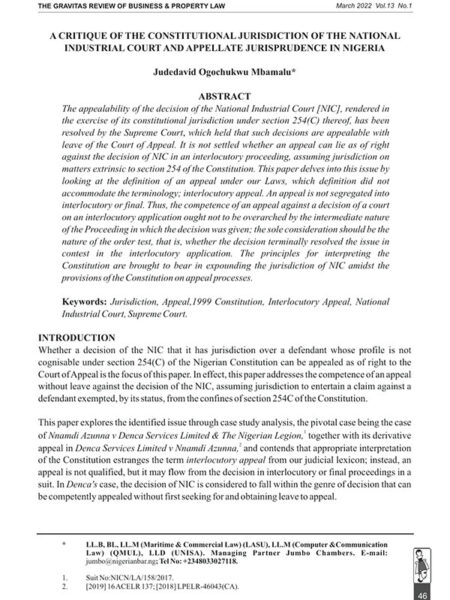
A Critique of the Constitutional Jurisdiction of the National Industrial Court and Appellate Jurisprudence in Nigeria
0₦2,500.00Dr Judedavid Mbamalu, Managing Partner of Jumbo Chambers, in his paper, A Critique of the Constitutional Jurisdiction of the National Industrial Court and Appellate Jurisprudence in Nigeria, argues that while the appealability of the decision of the National Industrial Court (NIC), rendered in the exercise of its jurisdiction under section 254(C) of the 1999 Constitution of Nigeria has been resolved by the Supreme Court, it is not settled whether an appeal can lie as of right against the decision of the NIC in an interlocutory proceeding, assuming jurisdiction on matters extrinsic to section 254. Dr Mbamalu argues that the segregation of appeals into ‘interlocutory’ and ‘final’ is unknown to ‘our Statutes and Rules of Court’, and the competence of an appeal against a decision of a court on an interlocutory application ought not to be overarched by the intermediate nature of the Proceeding in which the decision was given. He elaborates on the principles for interpreting the Constitution in expounding the jurisdiction of the NIC amidst the provisions of the Constitution on appeal processes.
-
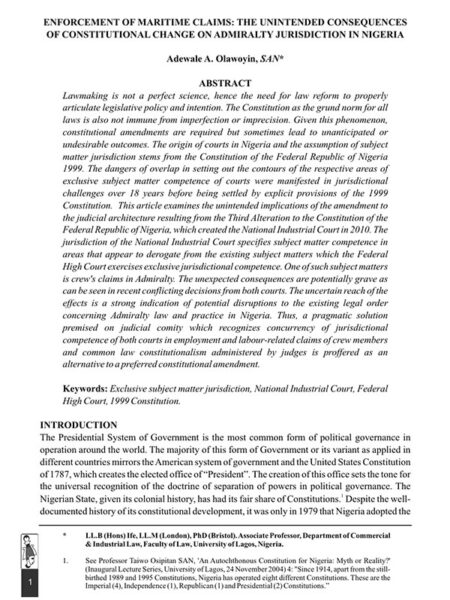
Enforcement of Maritime Claims: The Unintended Consequences of Constitutional Change on Admiralty Jurisdiction in Nigeria
0₦2,500.00Dr Adewale Olawoyin SAN, Associate Professor, Department of Commercial & Industrial Law University of Lagos Nigeria in his article, Enforcement of Maritime Claims: The Unintended Consequences of Constitutional Change on Admiralty Jurisdiction in Nigeria, examines the unintended implications of the Third Alteration to the 1999 Constitution of Nigeria. Section 251 of the 1999 Constitution vests exclusive jurisdiction in admiralty matters in the Federal High Court (FHC). Section 254C (1) of the Constitution (introduced by the Constitution of the Federal Republic of Nigeria (Third Alteration) Act 2010) vests exclusive jurisdiction in all labour and employment matters in the National Industrial Court (NIC). Meanwhile, by the Admiralty Jurisdiction Act(AJA) 1991, the admiralty jurisdiction of the FHC includes maritime claim. Section 2(3)(r) AJA provides that a ‘general maritime claim’ consists of a claim by a master or a member of a ship’s crew for wages or an amount that an employer is obliged to pay his employee. Section 5(3) AJA also provides that ‘maritime lien’ means a lien for wages of the master or of a member of a ship’s crew. Dr Olawoyin SAN considers conflicting decided cases on which Court, FHC or NIC, that would have jurisdiction in claims by the crew of a ship relating to their wages. He proposes legislative and judicial intervention to resolve the legal quagmire.
-
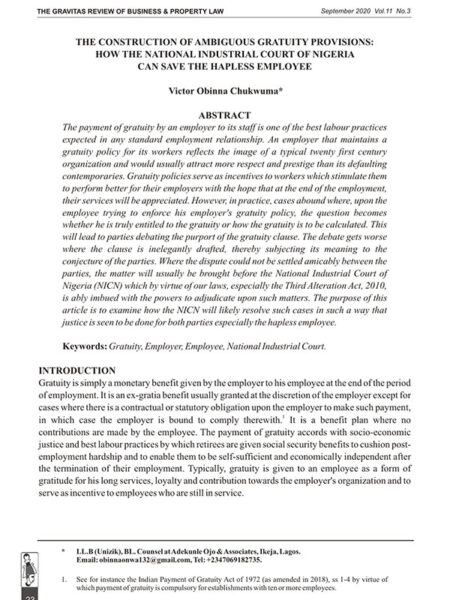
The Construction of Ambiguous Gratuity Provisions: How the National Industrial Court of Nigeria Can Save the Hapless Employee
0₦2,500.00Victor Chukwuma of Adekunle Ojo & Associates Lagos Nigeria, in his article, The Construction of Ambiguous Gratuity Provisions: How the National Industrial Court of Nigeria Can Save the Hapless Employee, examines the concept of Gratuity under Nigerian law. Chukwuma considers cases where the gratuity clause in the employment contract was in dispute and suggest mechanisms that may guide the National Industrial Court in resolving ambiguous gratuity clauses in employment contracts.
-
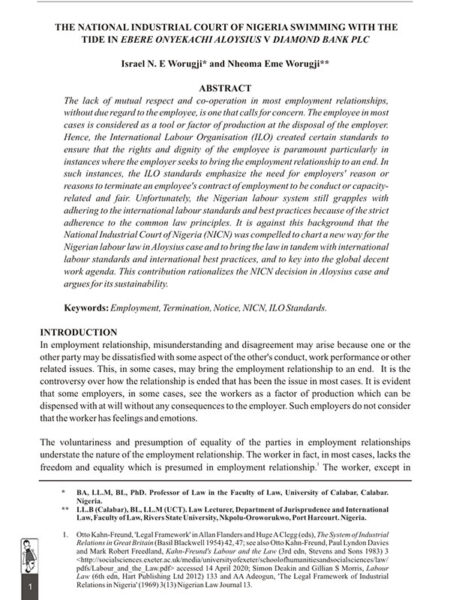
The National Industrial Court of Nigeria Swimming with the Tide in Ebere Onyekachi Aloysius V Diamond Bank Plc
0₦2,500.00Professor Israeli Worugji of the University of Calabar, Nigeria and Nheoma Worugji of the Rivers State University, Nkpolu-Oroworukwo Port Harcourt Nigeria, in their article, The National Industrial Court of Nigeria Swimming with the Tide in Ebere Onyekachi Aloysius V. Diamond Bank, note that ordinarily, an employer has the freedom to terminate the employment of an employee upon due notice and regardless of motive. The National Industrial Court of Nigeria (NICN) in a recent decision, however, seems to have limited the employer’s otherwise open-ended power to bring the contract of employment to an end. In Aloysius case, the NICN, relying on international labour standards and its new mandate under the Constitution (Third Alteration) Act, decided that no termination of a contract of employment should take place unless there is a valid reason connected with the capacity or conduct of the employee or based on the operational requirements of the establishment.Professor Israel Worugji and Nheoma Worugji review the Aloysius the case against the background of the common law and statutory provision on termination of employment, the International Labour Organisation’s instruments and international best practices.
-
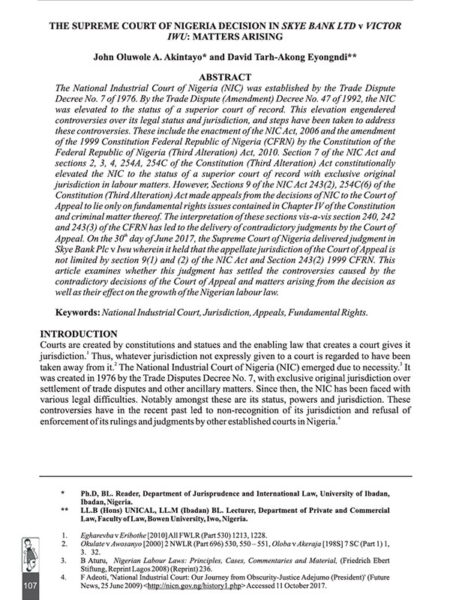
The Supreme Court of Nigeria Decision in Skye Bank Ltd v Victor Iwu: Matters Arising
0₦2,500.00John Akintayo, Reader, Department of Jurisprudence and International Law, University of Ibadan and David Eyongndi of the Department of Private and Commercial Law, Bowen University in their article, The Supreme Court of Nigeria Decision in Skye Bank Ltd. v. Victor Iwu: Matters Arising, consider the Iwu’s case as pivotal in the chequered jurisdictional history of the National Industrial Court (NIC). They analyse the relevant provisions of the NIC Act, 2006 and the Constitution of the Federal Republic of Nigeria (Third Alteration) Act, 2010. They examine the matters arising, and the unintended consequences of the decision in Iwu: that the appellate jurisdiction of the Court of Appeal to entertain appeals from the National Industrial Court is not restricted to fundamental rights issues contained in Chapter IV of the Constitution.
-
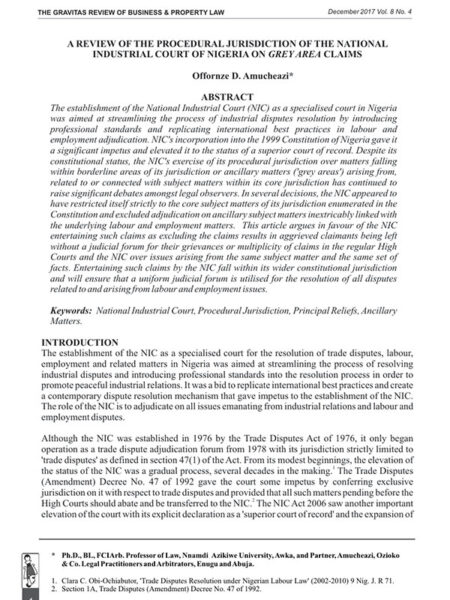
A Review of the Procedural Jurisdiction of the National Industrial Court of Nigeria on Grey Area Claims
0₦2,500.00Professor Offornze Amucheazi of Nnamdi Azikiwe University, Awka, and Partner, Amucheazi, Ozioko & Co, in his article, “A Review of the Procedural Jurisdiction of the National Industrial Court of Nigeria on Grey Area Claims”, examines the National Industrial Court’s exercise of jurisdiction over ancillary matters ‘arising from, related to or connected with’ subject matters within its core jurisdiction. He argues that despite being empowered in that regard, the NIC, from a review of several cases, appears to have restricted itself strictly to the core subject matters of its jurisdiction enumerated in the Constitution, and excluded adjudication on ancillary subject matters inextricably linked with the underlying labour and employment matters. He concludes that this cautious approach may leave aggrieved claimants without a judicial forum for their grievances, or lead to multiplicity of claims in different courts over issues arising from the same subject matter and the same set of facts.
-
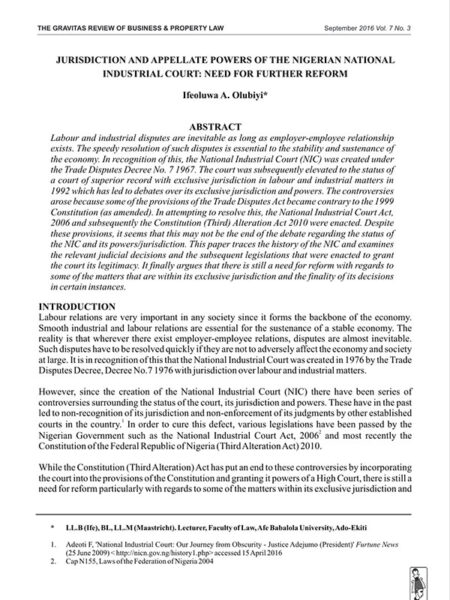
Jurisdiction and Appellate Powers of the Nigerian National Industrial Court: Need for Further Reform
0₦2,500.00Ifeoluwa Olubiyi, Lecturer, Faculty of Law, Afe Babalola University, Ado-Ekiti, in her article “Jurisdiction and Appellate Powers of the Nigerian National Industrial Court: Need For Further Reform” undertakes an historical analysis of the jurisdiction and status of the National Industrial Court as a court of record. She posits that while the Constitution of the Federal Republic of Nigeria (Third Alteration) Act 2010 may have put an end to some of the controversies surrounding the jurisdiction of the court, the finality of its decision, ‘exclusive jurisdiction’ in child labour, child abuse and human trafficking cases, and application of international treaties without domestication may be contrary to other sections of the Constitution.
The Gravitas Review of Business & Property Law



